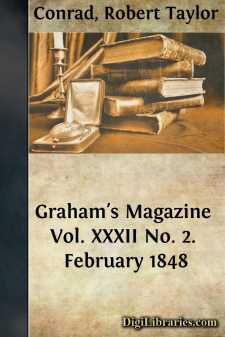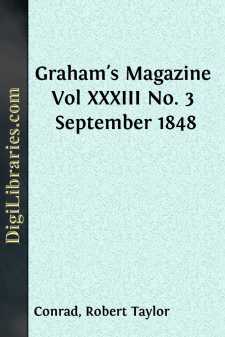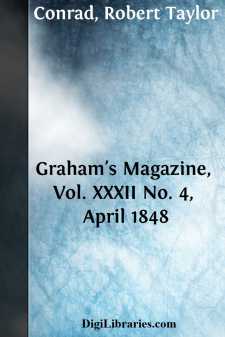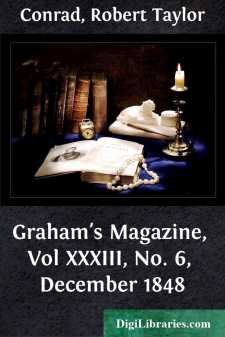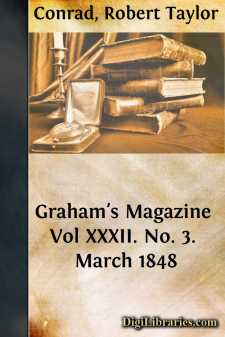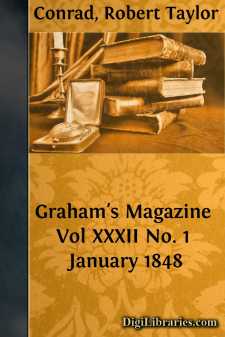Categories
- Antiques & Collectibles 13
- Architecture 36
- Art 48
- Bibles 22
- Biography & Autobiography 813
- Body, Mind & Spirit 142
- Business & Economics 28
- Children's Books 17
- Children's Fiction 14
- Computers 4
- Cooking 94
- Crafts & Hobbies 4
- Drama 346
- Education 46
- Family & Relationships 57
- Fiction 11829
- Games 19
- Gardening 17
- Health & Fitness 34
- History 1377
- House & Home 1
- Humor 147
- Juvenile Fiction 1873
- Juvenile Nonfiction 202
- Language Arts & Disciplines 88
- Law 16
- Literary Collections 686
- Literary Criticism 179
- Mathematics 13
- Medical 41
- Music 40
- Nature 179
- Non-Classifiable 1768
- Performing Arts 7
- Periodicals 1453
- Philosophy 64
- Photography 2
- Poetry 896
- Political Science 203
- Psychology 42
- Reference 154
- Religion 513
- Science 126
- Self-Help 84
- Social Science 81
- Sports & Recreation 34
- Study Aids 3
- Technology & Engineering 59
- Transportation 23
- Travel 463
- True Crime 29
Graham's Magazine Vol XXXIII No. 5 November 1848
Description:
Excerpt
It was a glad day in Venice. The eve of the feast of the Purification had arrived, and all those maidens of the Republic, whose names had been written in the "Book of Gold," were assembled with their parents, their friends and lovers—a beautiful and joyous crowd—repairing, in the gondolas provided by the Republic, to the church of San Pietro de Castella, at Olivolo, which was the residence of the Patriarch. This place was on the extreme verge of the city, a beautiful and isolated spot, its precincts almost without inhabitants, a ghostly and small priesthood excepted, whose grave habits and taciturn seclusion seemed to lend an additional aspect of solitude to the neighborhood. It was, indeed, a solitary and sad-seeming region, which, to the thoughtless and unmeditative, might be absolutely gloomy. But it was not the less lovely as a place suited equally for the picturesque and the thoughtful; and, just now, it was very far from gloomy or solitary. The event which was in hand was decreed to enliven it in especial degree, and, in its consequences, to impress its characteristics on the memory for long generations after. It was the day of St. Mary's Eve—a day set aside from immemorial time for a great and peculiar festival. All, accordingly, was life and joy in the sea republic. The marriages of a goodly company of the high-born, the young and the beautiful, were to be celebrated on this occasion, and in public, according to the custom. Headed by the Doge himself, Pietro Candiano, the city sent forth its thousands. The ornamented gondolas plied busily from an early hour in the morning, from the city to Olivolo; and there, amidst music and merry gratulations of friends and kindred, the lovers disembarked. They were all clad in their richest array. Silks, which caught their colors from the rainbow, and jewels that had inherited, even in their caverns, their beauties from the sun and stars, met the eye in all directions. Wealth had put on all its riches, and beauty, always modest, was not satisfied with her intrinsic loveliness. All that could delight the eye, in personal decorations and nuptial ornaments, was displayed to the eager gaze of curiosity, and, for a moment, the treasures of the city were transplanted to the solitude and waste.
But gorgeous and grand as was the spectacle, and joyous as was the crowd, there were some at the festival, some young, throbbing hearts, who, though deeply interested in its proceedings, felt any thing but gladness. While most of the betrothed thrilled only with rapturous anticipations that might have been counted in the strong pulsations that made the bosom heave rapidly beneath the close pressure of the virgin zone, there were yet others, who felt only that sad sinking of the heart which declares nothing but its hopelessness and desolation. There were victims to be sacrificed as well as virgins to be made happy, and girdled in by thousands of the brave and goodly—by golden images and flaunting banners, and speaking symbols—by music and by smiles—there were more hearts than one that longed to escape from all, to fly away to some far solitude, where the voices of such a joy as was now present could vex the defrauded soul no more. As the fair procession moved onward and up through the gorgeous avenues of the cathedral to the altar-place, where stood the venerable Patriarch in waiting for their coming, in order to begin the solemn but grateful rites, you might have marked, in the crowding column, the face of one meek damsel, which declared a heart very far removed from hope or joyful expectation. Is that tearful eye—is that pallid cheek—that lip, now so tremulously convulsed—are these proper to one going to a bridal, and that her own? Where is her anticipated joy? It is not in that despairing vacancy of face—not in that feeble, faltering, almost fainting footstep—not, certainly, in any thing that we behold about the maiden, unless we seek it in the rich and flaming jewels with which she is decorated and almost laden down; and these no more declare for her emotions than the roses which encircle the neck of the white lamb, as it is led to the altar and the priest. The fate of the two is not unlike, and so also is their character. Francesca Ziani is decreed for a sacrifice. She was one of those sweet and winning, but feeble spirits, which know how to submit only. She has no powers of resistance. She knows that she is a victim; she feels that her heart has been wronged even to the death, by the duty to which it is now commanded; she feels that it is thus made the cruel but unwilling instrument for doing a mortal wrong to the heart of another; but she lacks the courage to refuse, to resist, to die rather than submit. Her nature only teaches her submission; and this is the language of the wo-begone, despairing glance—but one—which she bestows, in passing up the aisle, upon one who stands beside a column, close to her progress, in whose countenance she perceives a fearful struggle, marking equally his indignation and his grief.
Giovanni Gradenigo was one of the noblest cavaliers of Venice—but nobleness, as we know, is not always, perhaps not often, the credential in behalf of him who seeks a maiden from her parents. He certainly was not the choice of Francesca's sire....



